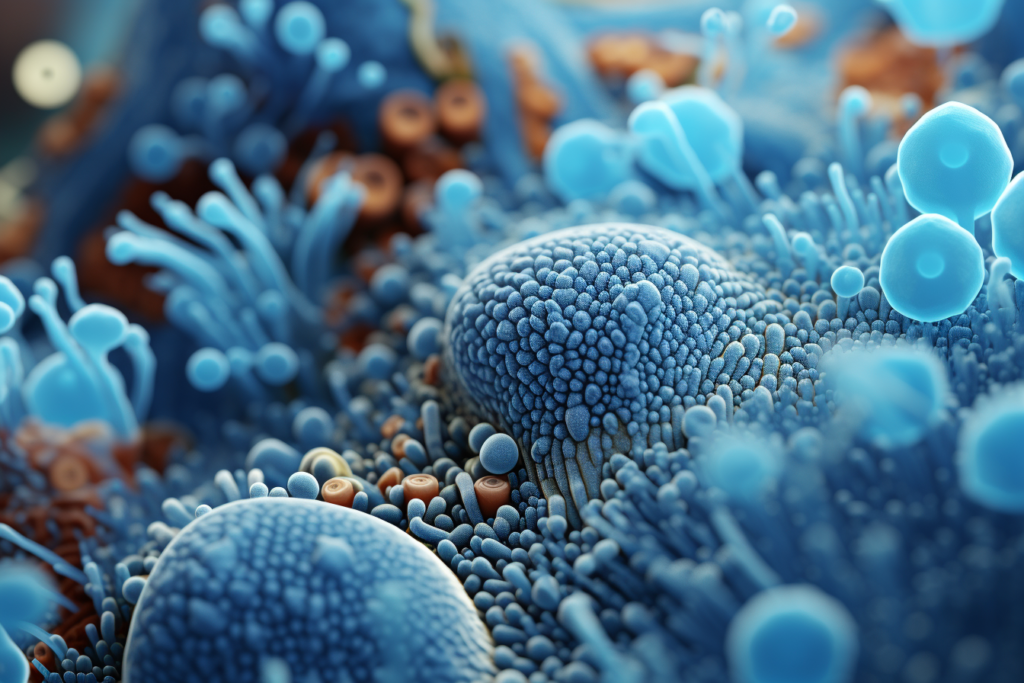Balancing the gut microbiome: a key to menopausal well-being
It was found that during menopause, a woman’s gut microbiome becomes less diverse and more “male-like.” And the problem is that we are losing the most essential for women’s health microbes. Can we counteract these changes? Why do some women go through menopause smoothly while others struggle with various symptoms? Can this imbalance be corrected with probiotics or diet change? And whether hormonal balance can be restored with special microorganisms — read and discover today.

In a 2022 study of a large group of Spanish women, it was found that during menopause, a woman’s gut microbiome becomes less diverse and more “male-like.” You might not think much about gender-related changes, but microorganisms that women lose during menopause are doing a great job. These tiny bacteria secrete specific molecules, that reduce inflammation in our gut and in the whole body. And it is proven that chronic inflammation is the root cause of multiple diseases, like heart disease, diabetes, and even dementia!
Why does this occur? Well, some of these microorganisms seem to need female hormones to feel good and reproduce themselves. As menopause causes a sharp drop in these hormones, these helpful microorganisms seem to vanish as a result. It’s like they’re packing their bags and leaving with the hormones!
Microbiome shifts in menopause and inflammation
Menopause leads to a decline in Faecalibacterium prausnitzii, a gut hero known for producing inflammation-reducing butyrate. Butyrate not only calms inflammation but also boosts intestinal cell energy, aiding in weight management and metabolic health. Furthermore, another microorganism, Akkermansia muciniphila becomes less abundant during menopause. This microbe is like a guardian for your gut, enhancing intestinal integrity, supporting metabolic balance, and boosting immunity.
So, although we haven’t unraveled all the mysteries of menopause-related microbiome changes, some of these shifts heighten the risk of gut inflammation. This inflammation, that onsets inside our body, can trigger metabolic issues, heart concerns, joint discomfort, and challenges related to brain health.
The role of gut bacteria in menopause-related health
Furthermore, scientists studying the effects of menopause on the gut have found something intriguing. They looked at the gut bacteria of women who went through menopause without health problems and compared them to those who experienced various health issues. The differences were significant!
In the intestines of women who had a smooth menopause, there were lots of specific bacteria like Aggregatibacter segnis, Bifidobacterium animalis, and Acinetobacter guillouiae. This exciting discovery has scientists thinking about creating a probiotic using these helpful microbes.
Oestrobolome: how your gut bacteria helps maintain estrogen balance
You’ve probably heard about estrogen, the key female hormone primarily made by our ovaries. When menopause hits, estrogen levels drop, leading to those pesky hot flashes and increased risks of heart disease and osteoporosis. To combat these changes, we often turn to hormone replacement therapy. Synthetic, or bioidentical, as a more safe choice. But did you know that our gut bacteria can also influence estrogen levels? Allow us to introduce you to the “oestrobolome.”
The oestrobolome is a collection of gut microorganisms that can process estrogens. When estrogen is either produced in our bodies or taken as medication, only a small part acts as a hormone, while the rest gets bound to specific compounds in the liver and deactivated. Yet, some clever gut bacteria produce enzymes, like β-glucuronidases, that can free and reactivate these bound estrogens.
In essence, our gut microbes help maintain sex hormone levels, especially critical for postmenopausal women with minimal ovarian estrogen and progesterone production.
While we’re still figuring out how to use these bacteria to ease menopausal symptoms, the presence or absence of these microorganisms will play a pivotal role in choosing the right hormone therapy dosage. The future may hold a promising combination of bio-identical hormone therapy and probiotics to maximize effectiveness.
Balancing the menopausal microbiome: a path to health resilience
How all that knowledge can help us? For now, there are two approaches that can be combined.
Hormone harmony. Since scientists believe that the primary cause of microbiome composition changes is the decrease in hormone levels — specifically, estrogen and progesterone — you can counteract these changes by minimizing hormone fluctuations as much as possible. This can be achieved through bio-identical hormone therapy.
Dietary allies. The other strategy involves nurturing “beneficial” microorganisms in your gut that tend to vanish during menopause. By understanding which “good guys” disappear from our gut during menopause, we can help maintain their numbers by altering our diet. For example, Akkermansia thrives on foods like curcumin, epigallocatechins from green tea, and polyphenols from berries. Faecalibacterium prausnitzii can be supported by prebiotics such as inulin-type fructans and arabinoxylans found in chicory roots, wheat, onions, bananas, garlic, leeks, and kiwifruit capsules (which was shown in a clinical trial).
Menopause brings about significant changes in the gut microbiome, impacting hormonal balance and disease risks. Understanding these changes and taking steps to support a healthy microbiome can be essential for our well-being during this stage of life. Keep your hormones steady with BHT, and feed your gut’s friendly helpers with the right foods. It’s a two-step strategy for a smoother menopause journey.
Book your complimentary discovery call
Fancy a diet make-over? Our 12-week programme uses real-time blood glucose monitoring, tailored nutrition, and hormone balancing to help you regain control of your diet and vitality during menopause.
